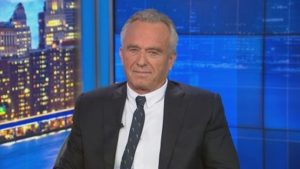As RFK Jr. advances his regulatory reform agenda, industries brace for potential upheaval, with fears of revenue losses and overhauled practices in health and food regulations.
RFK Jr. Sparks Industry Turmoil with Proposed Regulatory Reforms

RFK Jr. Sparks Industry Turmoil with Proposed Regulatory Reforms
Robert F. Kennedy Jr.'s plans for major changes in the health and food sectors are causing alarm among industry leaders and lobbyists.
The health and food industries find themselves at a crossroads as Robert F. Kennedy Jr. wields growing power in Washington, advocating for sweeping regulatory changes. His proposals, which include tighter pesticide controls and a reassessment of vaccine safety protocols, are instilling fear among corporate lobbyists and industry executives. If Kennedy's reforms are implemented, they may severely impact profitability across various sectors, prompting businesses to rethink their strategies.
Kennedy's bold initiatives aim to ban highly processed foods in educational settings and revamp the federal agencies governing food and health regulations. Such actions challenge entrenched industry norms and put at risk billions of dollars in potential revenues. The uncertainty from these changes is palpable on K Street, Washington's lobbying hub, where businesses are struggling to discern how to respond to Kennedy's mounting influence.
Corporate leaders are exercising caution, according to John Strom of Foley and Lardner. “A wait-and-see approach is sensible,” he advises, noting that companies should avoid antagonizing Kennedy prematurely. This attitude reflects a broader strategy among lobbyists, who recommend restraint while they analyze the implications of Kennedy’s proposals.
The stakes are particularly high for sectors directly impacted by Kennedy's agenda. Stricter pesticide regulations threaten agricultural earnings, while a ban on processed foods in schools could upend the food production and distribution landscape. Additionally, the health industry faces challenges due to Kennedy's renewed focus on vaccine safety, adding further complications to an already volatile scenario.
In anticipation of potential policy shifts, companies are eager to leverage existing ties to Kennedy, striving to reduce the possible impacts of his proposed changes. The focus for many remains on nurturing collaborative relationships, rather than adopting confrontational stances. As Strom noted, “Businesses wish to avoid starting off on the wrong note with Kennedy.”
With President Trump's recent actions strengthening Kennedy's platform, affected industries are increasingly unsettled. Lobbyists are inundated with requests for guidance as the threat of extensive regulatory changes looms large, leaving the status quo in disarray. The future remains uncertain: whether Kennedy's initiatives will be realized remains unclear, yet the health and food industries are gearing up for a significant transformation.























